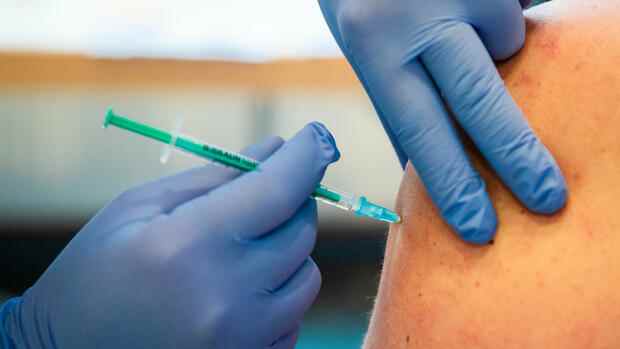Frankfurt A committee of experts from the European medicines agency Ema recommended on Thursday the approval of the Omikron booster vaccinations from Biontech/Pfizer and Moderna in Europe. The official approval by the European Commission should follow shortly.
This means that citizens in Germany who want to be vaccinated will probably have the opportunity to be boosted with an adapted Omicron vaccine against the Sars-Cov-2 virus from next week. According to Health Minister Karl Lauterbach (SPD), the first doses of these vaccines are to be delivered from September 5th.
The mRNA vaccines from Biontech/Pfizer and Moderna are adapted to the SARS-Cov-2 subvariant BA.1, which spread worldwide from last winter. In the meantime, however, the BA.5 variant determines the course of infection.
At the end of last week, Biontech and Pfizer completed the application for approval from Ema for a booster dose tailored to the Omikron variants BA.4 and BA.5. According to Health Minister Lauterbach, the authority could approve this vaccine at the end of September or beginning of October. Then Germany should quickly receive a first tranche of 9.5 million doses.
Top jobs of the day
Find the best jobs now and
be notified by email.
The US Food and Drug Administration (FDA) granted emergency use authorization for the BA.4 and BA.5 vaccines from Biontech/Pfizer and Moderna on Wednesday. While Ema continues to adhere to its practice of requiring results from clinical studies, i.e. testing on humans, data from animal experiments on the Omicron variants BA.4/BA.5 and clinical studies on BA.1 were sufficient for the FDA for emergency approval out.
>> Read also: New Omicron vaccines are coming: Who could now be vaccinated with which vaccine
In the summer, the FDA asked manufacturers to develop a vaccine that also covers the predominant subvariants BA.4 and BA.5. However, the manufacturers still have to deliver clinical studies on the effectiveness in humans.
The new booster vaccines are so-called bivalent vaccines, which, in addition to the BA subvariant, are also adapted to the original virus that first appeared in Wuhan. The mRNA vaccines contain gene sections of the virus variants that serve as blueprints for proteins in the human body that trigger an immune response.
The European approval for the vaccines adapted to BA.1 applies to people aged twelve and over who have received at least one Covid 19 vaccination and whose last vaccination was at least three months ago. In clinical studies, the funds from Biontech and the US partner Pfizer as well as Moderna had shown a significant increase in neutralizing antibodies against this variant compared to the original vaccine from the manufacturer. However, the protection against the newer variants BA.4 and BA.5 was lower.
Ema does not give a recommendation as to who should be vaccinated. In Germany, this is done by the Standing Vaccination Commission (Stiko), which is still working on an assessment specifically for the new BA.1 vaccines.
Is the BA.4/BA.5 booster worth the wait?
The Stiko currently only recommends a second booster vaccination for people over the age of 60 and people aged five and over who have a higher risk of a serious course of the disease due to an underlying disease. Stiko recommended these risk groups not to wait for an adapted vaccination to refresh their vaccination protection.
For those who want to be vaccinated in Germany, the question arises as to whether they should be boosted with the BA.1 vaccine when a vaccine adapted to BA.5 should be available in a few weeks. There is not yet a comparison of how effectively the two adapted vaccines protect humans against Covid 19 disease.
The data on the bivalent Omikron BA.4/BA.5 vaccines from Pfizer and Biontech as well as Moderna have so far come from the preclinical phase, i.e. animal experiments. Clinical studies with test subjects have only just started.
Immunologist Carsten Watzl advises those who want to be vaccinated against waiting for the BA.4/BA.5 vaccine. “So far there is no clinical data on this vaccine candidate,” said the Secretary General of the German Society for Immunology of the dpa news agency. One can only speculate about the benefits – also in view of the unforeseeable development of the prevailing variants in the coming months.
Biontech founder Ugur Sahin recently told “Spiegel” that there was no huge difference between his company’s two vaccines. “Both have shown in studies that they produce a clearly superior antibody response to omicron compared to the original vaccine,” explained Sahin.
Scientists are debating whether an approval procedure for booster vaccines adapted to new virus variants and based on vaccines that have already been approved cannot be significantly simplified. The FDA has broken new ground here with emergency use authorization based on preclinical data.
In addition, the mRNA vaccines from Biontech and Moderna, in which an mRNA sequence was exchanged for each of the omicron variants, have meanwhile been vaccinated billions of times and show overall good safety and tolerability.
More: Omikron vaccine should bring turnover turnaround for Biontech
